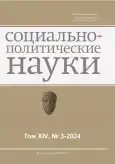The potential of artificial intelligence in crime investigation: for or against
- Authors: Berova J.M.1, Tutukov A.Y.1
-
Affiliations:
- North Caucasus Institute for Advanced Studies (branch) of the Krasnodar University of the Ministry of Internal Affairs of Russia
- Issue: Vol 14, No 3 (2024)
- Pages: 96-100
- Section: New issues in law
- URL: https://journals.eco-vector.com/2223-0092/article/view/635474
- DOI: https://doi.org/10.33693/2223-0092-2024-14-3-96-100
- EDN: https://elibrary.ru/IYFBWZ
- ID: 635474
Cite item
Abstract
Digital technologies are an essential element of modern life. Measures aimed at the use of artificial intelligence are recognized as a strategic direction of scientific and technological development of the Russian state. Research into the capabilities of artificial intelligence is mainly carried out from the point of view of its technical and civil components. But in recent years, artificial intelligence technologies have been widely introduced into law enforcement, in particular into the practice of investigating and solving crimes.
The purpose of this article is to analyze the capabilities of artificial intelligence and determine the feasibility or inexpediency of its use in the investigation of crimes. To achieve this goal, the conceptual and categorical apparatus is considered, the signs of artificial intelligence are analyzed, on the basis of which the advantages and disadvantages of using this technology by law enforcement agencies are revealed.
The authors conclude that it is advisable to use artificial intelligence in the investigation of crimes, taking into account all the capabilities and limitations of the technology in question.
Full Text
About the authors
Julietta M. Berova
North Caucasus Institute for Advanced Studies (branch) of the Krasnodar University of the Ministry of Internal Affairs of Russia
Author for correspondence.
Email: berova-d@yandex.ru
SPIN-code: 1908-7973
Dr. Sci. (Law), Associate Professor, Police Colonel; Professor, Department of Special Technical Training
Russian Federation, NalchikAlbert Y. Tutukov
North Caucasus Institute for Advanced Studies (branch) of the Krasnodar University of the Ministry of Internal Affairs of Russia
Email: Lel4993@rambler.ru
SPIN-code: 8425-5677
Cand. Sci. (Law), Associate Professor; associate professor, Department of Internal Affairs Operations in Special Conditions
Russian Federation, NalchikReferences
- Vasiliev A.A., Shpopper D., Mataeva M.Kh. The term “artificial intelligence” in Russian law: Doctrinal analysis. Jurislinguistics. 2018. No. 7.
- Kapliev A.S. Criticism of the national strategy for the development of artificial intelligence for the period until 2030. Law and State: Theory and Practice. 2020. No. 2 (182).
- Mansurov G.Z. Concept and signs of artificial intelligence. Law and State: Theory and Practice. 2023. No. 11 (227).
- Papysheva E.S. Limits of admissibility of the participation of artificial intelligence in sentencing. Gaps in Russian legislation. 2023. Vol. 16. No. 5.
- Ponomareva E.V. Subjects and quasi-subjects of law: theoretical and legal problems of delimitation: Dis. ... of Cand. Sci. (Law). Ekaterinburg, 2019.
- Solomonov E.V. Concept and signs of artificial intelligence. Bulletin of Omsk University. Series: Law. 2023. Vol. 20. No. 4.
- Sretentsev A.N. On the question of the possibilities of artificial intelligence in solving problems of forensic science. Public Service and Personnel. 2023. No. 4.
- Channov S.E. Robot (artificial intelligence system) as a subject (quasi-subject) of law. Current Problems of Russian Law. 2022. No. 17 (12).
- Cherdakov O.I. The attitude of the state and business to the development and implementation of artificial intelligence technologies in the Russian financial sector and economy. Banking Law. 2022. No. 5.
Supplementary files











